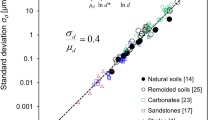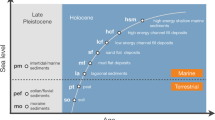Abstract
THE geochemical distribution of elements in sedimentary rocks is genetically complex because they may be concentrated in the detrital fraction or resistates; the clay fraction; the chemically precipitated fraction; and the organically precipitated fraction. It follows that advances in sedimentary geochemistry depend on increased knowledge of the distribution of elements in these four constituents. Hence, analysis of the bulk rock, which is generally the standard practice in igneous geochemistry, may not be a successful method when applied to problems in sedimentary geochemistry.
This is a preview of subscription content, access via your institution
Access options
Subscribe to this journal
Receive 51 print issues and online access
$199.00 per year
only $3.90 per issue
Buy this article
- Purchase on Springer Link
- Instant access to full article PDF
Prices may be subject to local taxes which are calculated during checkout
Similar content being viewed by others
References
Harder, H., Nachr. Akad. Wiss. Göttingen, Math.-Phys. Klasse, No. 5, No. 6, 67 (1959).
Frederickson, A. F., and Reynolds, R. C., Oil and Gas J., 58, 154 (1960).
Harder, H., Geochimica et Cosmochimica Acta, 21, 284 (1961).
Author information
Authors and Affiliations
Rights and permissions
About this article
Cite this article
WALKER, C. Separation Techniques in Sedimentary Geochemistry illustrated by Studies of Boron. Nature 194, 1073–1074 (1962). https://doi.org/10.1038/1941073a0
Issue Date:
DOI: https://doi.org/10.1038/1941073a0
This article is cited by
-
Paleosalinity and Its Association with Organic Matter: A Case Study from the Eocene Shahejie Formation, Laizhou Bay Sag, Bohai Bay Basin (China)
Journal of Ocean University of China (2021)
-
Boron Content in Relation to Organic Carbon and to Palaeosalinity in Certain British Upper Carboniferous Sediments
Nature (1966)
-
Reliability of Spectrochemical Analyses of Boron in Illites
Nature (1965)
-
Boron Content in Relation to Organic Carbon in Certain Sediments of the British Coal Measures
Nature (1962)
Comments
By submitting a comment you agree to abide by our Terms and Community Guidelines. If you find something abusive or that does not comply with our terms or guidelines please flag it as inappropriate.



